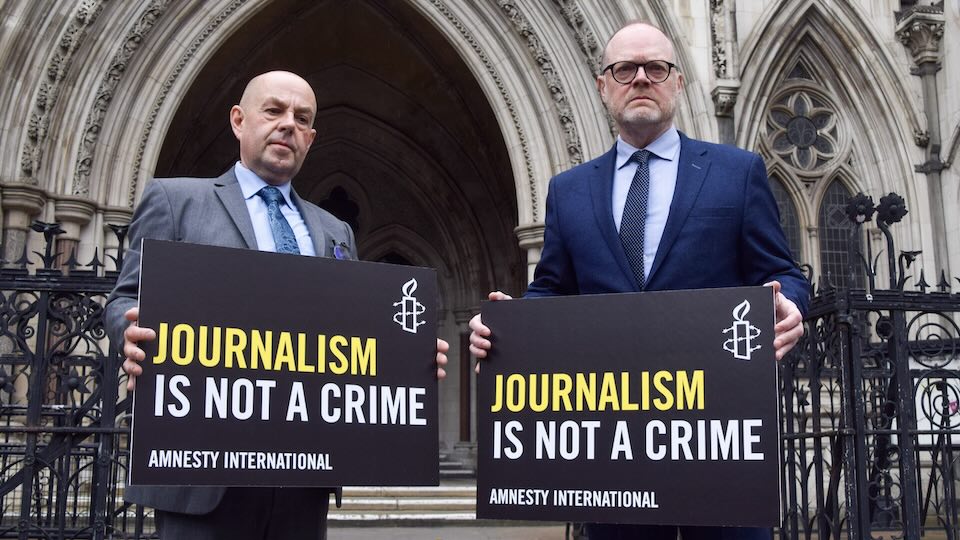Northern Ireland: Police unlawfully spied on journalists

Police in Northern Ireland waged an illegal surveillance campaign against journalists Trevor Birney and Barry McCaffrey, a British court ruled last week. The police had attempted to identify the reporters’ sources.
Britain’s Investigatory Powers Tribunal ruled that the surveillance authorization obtained by police violated the European Convention on Human Rights. The tribunal “is the only British court with the power to rule on covert surveillance operations by the intelligence agencies and police,” according to the Guardian. It awarded each journalist £4000 in damages.
Investigating the police
Birney and McCaffrey produced the 2017 documentary “No Stone Unturned.” The film examines an event known as the Loughinisland massacre: In 1994, members of a Unionist paramilitary group murdered six Catholics in a bar in Loughinisland. According to the filmmakers’ research, police at the time protected the murderers – to this day no one has been prosecuted.
In 2018, the Police Service of Northern Ireland (PSNI) arrested the two journalists and searched their homes and offices on suspicion that they had stolen police documents. These measures were declared illegal in 2019 – and the PSNI was made to pay the reporters a penalty in the amount of £875,000.
That same year, Birney and McCaffrey filed a complaint with the tribunal alleging that the 2018 search was “not the only attempt made to identify their confidential sources.”
Rights violated
As the BBC reports, the PSNI claimed before the tribunal that its surveillance operation was targeted only at an official working for the Police Ombudsman for Northern Ireland, an independent public body responsible for exercising oversight over the police force. The Police Ombudsman had been conducting an investigation into the Loughinisland murders – and internal documents taken from this investigation appear in the film. The police sought to determine whether an official at the ombudsman’ s office was meeting with the journalists.
The court rejected this claim, however, ruling that Chief Constable Sir George Hamilton, then head of the PSNI, had failed to “consider whether there was an overriding public interest justifying an interference with the integrity of a journalistic source.” The journalists’ rights had been violated as a result of the surveillance.
During the proceedings the tribunal also determined that McCaffrey had been the target of unlawful surveillance on a previous occasion as well: London’s Metropolitan Police had requested the journalist’s phone records in 2012. The following year the PSNI asked for these records, after McCaffrey, who was investigating allegations of bribery against a senior police official, had contacted the PSNI’s press office.
The phone records request also targeted Vincent Kearney, a journalist then working for the BBC – a complaint made by Kearney and the BBC is still before the tribunal.
Demand for further investigations
Reporters without Borders (RSF) welcomed the court’s ruling and said it underscores journalists’ fundamental right to protect their sources.
Fiona O’Brien, Director of RSF’s UK Bureau, said in a statement that this was “a landmark case for press freedom. It is deeply shocking that police showed such disregard for the vital right of journalists to protect their confidential sources.” Safeguards are needed, she said, to ensure such abuses aren’t repeated.
Patrick Corrigan, Northern Ireland Director for Amnesty International, echoed this assessment: “The right of journalists to protect their sources is a cornerstone of a free society.” Police in Northern Ireland “saw fit to ride roughshod” over this right.
Corrigan also lamented that while the police considered it appropriate to arrest journalists who had exposed their complicity in the Loughinisland murders, “twenty years on they have still arrested no one for those murders.”
Amnesty also pointed to the tribunal’s findings that police had obtained the phone records of more than a dozen investigative journalists working for a BBC TV program. The organization called on the PSNI to disclose “all instances of its abuse of surveillance powers against journalists and others,” and expressed hope that the McCullough Review would provide answers. This, according to the BBC, “is an independent review of any use of surveillance against journalists and other specific groups by the PSNI” that was announced in June.
The journalists Birney and McCaffrey said that the ruling was a significant victory for the freedom of the press and called for police reforms to enforce respect for that freedom. Both reporters are also calling for a public inquiry – because their case could just be the tip of the iceberg.
McCaffrey added a further note of criticism, saying that the police wasted “time and resources going after us instead of the Loughinisland killers.”
Birney told the Guardian: “We’re delighted after six years that we’ve got this victory, but this isn’t so much for us; it’s about journalism throughout the UK.”
The current head of the Police Service of Northern Ireland said he accepted the ruling. (js)